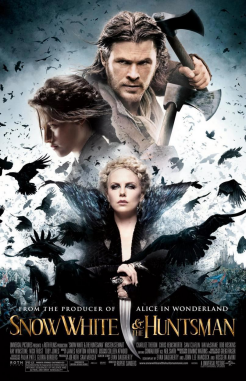Print Edition: June 6, 2012
 A movie of blatant gestures and pre-determined narrative, Snow White and the Huntsman is, at its core mentality, not that different from the Disney image it wishes to distance itself from. This, you see, is a fairy tale for a supposedly new generation with a different attitude, but isn’t that what Disney was all about? One chose sterilized simplicity, the other the acrid and mud-caked, but both are fables with their subtext wrung out, leaving the vestiges of familiar but mundane details about parental figures of abuse, the perils of vanity and quick thinking on the part of the younger generation.
A movie of blatant gestures and pre-determined narrative, Snow White and the Huntsman is, at its core mentality, not that different from the Disney image it wishes to distance itself from. This, you see, is a fairy tale for a supposedly new generation with a different attitude, but isn’t that what Disney was all about? One chose sterilized simplicity, the other the acrid and mud-caked, but both are fables with their subtext wrung out, leaving the vestiges of familiar but mundane details about parental figures of abuse, the perils of vanity and quick thinking on the part of the younger generation.
It’s lovable heroism to be sure, but instead of the type of delineating that might make said heroism (Kristen Stewart, Chris Hemsworth, and friends) the kind that has to grapple with the problems above, everything is conveyed through the lens of Destiny, an iconic framework that makes every scene one step towards the inevitable Great Battle of Destiny. Militaristic might takes over personal inquiry. Queen Ravenna, (Charlize Theron), rendered as a tortured soul through backstory, becomes less and less complicated as the story progresses, transformed from person to figurative force, evoking nothing more than the petulant misanthrope Theron played in Young Adult.
Almost everyone in Snow White and the Huntsman is similarly laden with backstory, furthering the dissonance of the hero’s journey plot at its centre. From the huntsman (see also John Carter) to the dwarves (“We used to have pride”), everyone is intent on shying away from the present to dwell in their own narratives, a mismatch with the overarching premise that everyone is working together to achieve their final goal of victory. This provides some of the movie’s few awkwardly weighty moments, as in a mountain trek that draws comparison to similar shots in The Lord of the Rings, but cast here as a plodding flight, rather than heroic run (with music to match). The narrative stifles it, but these are characters bogged down by history.
Director Rupert Sanders is a simulacrum of a stylist, applying the lifeless thrills of Ridley Scott to the machinic, disconnected battles and showing off spells in all their forms using the shorthand imagery he garnered a reputation for as a commercial director. Whether cataloguing a menagerie of sub-del Toro creations (twice) or carrying over the inky spills and burning flesh of his work for Trent Reznor and Atticus Ross, Sanders shows an instinct for getting things to look “right,” in a way that matches what medieval reconstruction experts, battle choreographers and previous imaginers have established as a capital-S standard.
Where a real attitude emerges the most is in Snow White and the Huntsman’s deliberate cautiousness. Never so bold as something like The Company of Wolves nor navigated through conventions as easily as Stardust, this Snow White is one who spends the majority of her onscreen existence reciting, whimpering and staring, waiting for something to happen that “no one’s ever seen before.” When it does happen, it’s gone in a flurry and one wonders if it was anything special to begin with.


